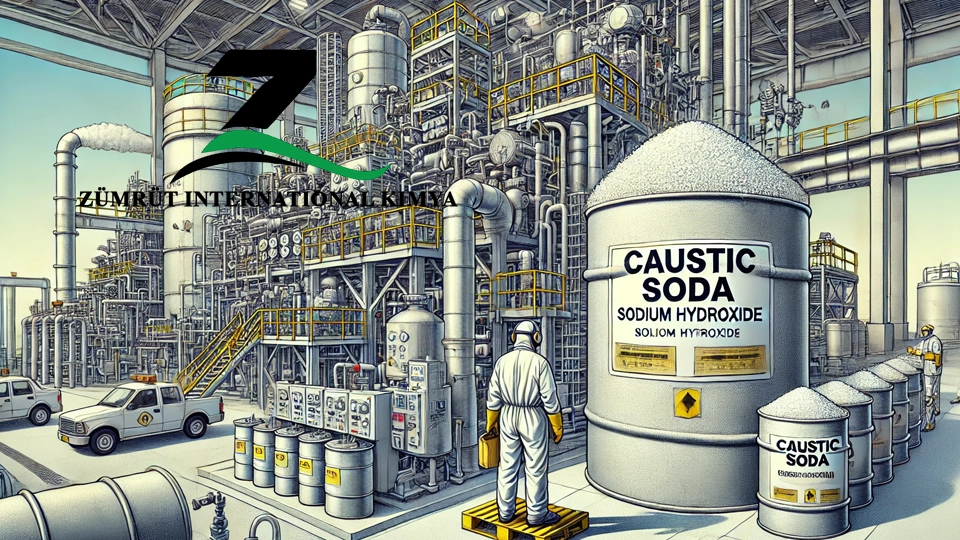Sodium Hydroxide (Caustic Soda) in Oil Refining

Introduction to Sodium Hydroxide in Oil Refining
Sodium hydroxide, commonly known as caustic soda, is a cornerstone of the oil refining industry. As a powerful alkaline compound, it is pivotal in transforming crude oil into high-quality fuels and lubricants while safeguarding refinery equipment and meeting environmental regulations. This article explores the indispensable applications of sodium hydroxide in oil refining, its benefits, and best practices for safe handling.
What is Sodium Hydroxide?
Sodium hydroxide (NaOH) or Caustic soda is a highly versatile, strong alkaline chemical used across industries, with oil refining being one of its most critical applications. Known for its ability to neutralize acids and break down organic compounds, caustic soda is essential in desulfurization, acid neutralization, and wastewater treatment. Its reactivity and solubility make it ideal for refining crude oil into products such as gasoline, diesel, and jet fuel.
Why Sodium Hydroxide is Critical in Oil Refining
Caustic soda’s unique chemical properties make it indispensable in modern refineries. Below are its primary roles:
1. Neutralizing Acids in Crude Oil
Crude oil contains corrosive organic acids and sulfur compounds that damage equipment and degrade product quality. Caustic soda neutralizes these acids, protecting infrastructure and ensuring the production of stable, high-value refined oils.
2. Desulfurization for Cleaner Fuels
Sulfur compounds in crude oil contribute to harmful emissions. Caustic soda reacts with sulfur to form water-soluble salts, which are easily removed. This process reduces sulfur content in fuels, aligning with global environmental standards like the EPA’s Tier 3 regulations.
3. Soap Stock Removal in Edible Oil Production
In edible oil refining, Caustic soda saponifies free fatty acids, converting them into soap stock. This impurity is then separated, yielding purer oils for consumer use.
4. Wastewater Treatment
Refineries generate acidic wastewater laden with contaminants. Caustic soda neutralizes this wastewater, enabling safe disposal or recycling and minimizing environmental impact.
Key Applications of Sodium Hydroxide in Refineries
Caustic Washing
Caustic soda scrubs impurities like hydrogen sulfide (H₂S) and carbon dioxide (CO₂) from refinery gases. This eliminates odors, reduces emissions, and enhances product quality while supporting compliance with air quality standards.
Mercaptan Removal
Mercaptans, notorious for their foul odor, are sulfur-based compounds in crude oil. Caustic soda converts mercaptans into harmless salts, ensuring odor-free fuels and improving marketability.
Spent Caustic Treatment
After use, spent caustic contains hazardous contaminants. Proper treatment with sodium hydroxide neutralizes these residues, enabling safe disposal or reuse and promoting circular economy practices in refineries.
Benefits of Sodium Hydroxide in Oil Refining
- Superior Product Quality
By removing sulfur, acids, and impurities, Caustic soda ensures refined oils meet stringent quality benchmarks, increasing their market value. - Equipment Longevity & Cost Savings
Neutralizing corrosive acids prevents pipeline and reactor damage, reducing maintenance costs and downtime. - Environmental Compliance
Lower sulfur emissions help refineries adhere to regulations like the Clean Air Act, reducing ecological footprints. - Operational Efficiency
Streamlined purification processes cut operational costs and boosted refinery output, enhancing profitability.
Packaging & Safety Guidelines for Sodium Hydroxide
Caustic soda is typically sold in flakes, pellets, or liquid form. Key packaging practices include:
- Solid Forms: Packaged in moisture-resistant, sealed containers to prevent degradation.
- Liquid Forms: Stored in leak-proof drums or intermediate bulk containers (IBCs).
Safety Protocols:
- Use PPE (gloves, goggles) to avoid skin/eye contact.
- Store in cool, dry areas away from acids.
- Follow OSHA guidelines for handling and spill management.
Conclusion
From neutralizing acids to enabling cleaner fuels, sodium hydroxide (caustic soda) is a linchpin of efficient, eco-friendly oil refining. Its applications not only enhance product quality and equipment durability but also ensure compliance with evolving environmental standards. As refineries prioritize sustainability, sodium hydroxide remains a vital ally in achieving safer, greener, and more profitable operations.

